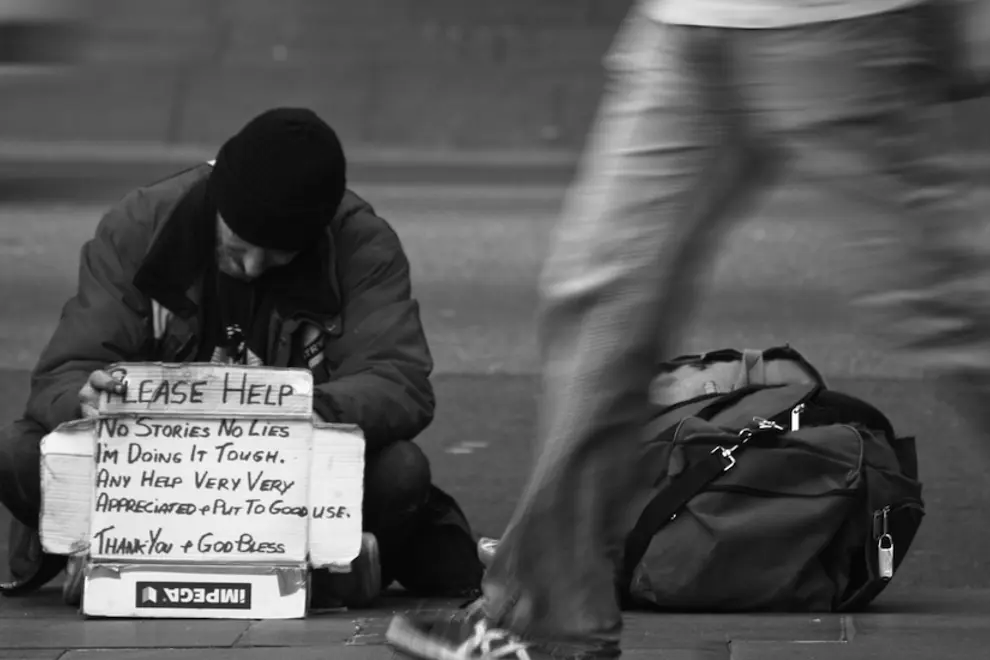By Jackson Lavell-Lee, header photo via.
Ever bummed a cigarette? Yeah you have, we all have. The desperation for that few minutes of satisfaction after a few drinks, or when you’d run out and couldn’t get to the nearest servo or Freechoice. With that in mind, would you give a cigarette to someone that sleeps on the streets? I hope you would. Do you spare a few cents when you walk around the CBD if a homeless person asks?
Everyone needs shelter sometimes. Everyone needs food. And sadly a lot of people have a negative stigma against people who are homeless. Typical phrases include “I wonder what they did to wind up there” or “I don’t want to give them money because they’ll spend it on drugs”. These prejudices may sometimes have a foundation but how do you know what type of person has just braved another freezing winter's night, feeling the bitter drafts between buildings, competing for the best bench.
In Australia on any given night around 1 in 200 people are homeless. 42% of those who are homeless are under the age of 25. The highest age bracket of homeless people is between the age of 25 and 34. These young people have dreams and aspirations, and most of the other 199 would walk past them without blinking an eye.
In Western Australia alone there were 9,595 people who reported homelessness in 2014. In 2015 when the unemployment rate has reached 6.0% homelessness is also expected to have grown. In 2007 new Prime Minister Kevin Rudd stated that his government would tackle the issue of homelessness in Australia. In the previous year the Commonwealth census had found the number of people living homeless in 2006 was 105,000. Four years after the 2011 census concluded that the number of homeless had increased by 8% and continues to rise.
Don't miss a beat with our FREE daily newsletter
Have you ever spoken to a homeless person? If you are kind and they respond with gratitude it can be an enriching experience, one that opens your mind to the hardship and misfortune that is the unpredictability of modern life.
Last week I stopped outside work to see a man with a compassionate sign lying with his golden retriever for warmth on the street on a rather rainy day. He looked over and saw me lighting a smoke. We met eyes and I decided that morning I would take some time out to share a cigarette with someone who needed a small gesture to brighten his morning after enduring a sleepless nightmare in the rain.
He made me realise the importance of storytelling in human rights advocacy, this man's story had to be told. His name has been left out as requested. He was a proud infantryman of the Australian Defence Force working for operation PALATE II until the end of 2007 when he came home to start a crayfishing business out of Fremantle travelling with one other mate to fish spots including Rottnest, Lancelin, Jurien Bay, Exmouth and Carnarvon. Unfortunately due to tough economic times, rising costs and restriction from the Western Australian Fisheries department his dream business failed.
Operation PALATE II is the ADF contribution to the United Nations Assistance Mission to Afghanistan UNAMA - a political mission in March 2002 by UN Security Council Resolution 1401, designed to promote reconciliation and rapprochement via managing humanitarian relief, recovery, and reconstruction in the war-torn country.
How is a person that invested his blood sweat and tears amongst struggling people of another culture for the benefit of humanitarian recovery overlooked by those in his own? Sure he was a rough and proud man who refused help and "didn’t mind toughing it" with Beau, his golden retriever. But what is being done for this man who complained the government had forgotten his hardship and ignored his fight with post-traumatic stress disorder, sparking alcohol and drug problems once he had begun his new fishing venture.
This man who has never asked for a handout was then refused work after a few violent episodes at unqualified jobs such as the deli section of Coles and working behind the counter of northern suburbs tobacconist. I don’t know about you, but I’d go a little crazy if I went from saving peoples lives to selling meats and pastries. He said he was “ashamed” and “disheartened” by his behavior and his current situation was his "way of finding himself".
He told me he is 33 years old. I gave him a few cigarettes and some cash. He gave me a bone-crunching hug, said “you’re not half bad” and Beau licked me as though he'd mistaken me for a treat.
I don’t know about you but I have slept on a bench in the city one night (after a particularly unbalanced night of tequila, beer and kebabs), but it was a goddamn freezing, embarrassing and disheartening experience ended by a cop waking me and giving me a move on notice. Funny for me because I had a home to go to but couldn’t manage to walk straight, let alone get there. This however is a reality for many homeless people. They are forced to move from there sleeping spots on a regular basis by police.
At a recent forum on homelessness in Melbourne a young man passionately said, "I want to close my own door of a night. The door to my home, not someone else’s," which makes the definition of homelessness a lot more complex, it's true that people want to feel their own level of ownership and entitlement, not just staying at temporary accommodations.
Homelessness Australia defines homelessness as; “On the most basic level homelessness is the state or condition of having no home. But what is ‘Home?’ A home is merely more than having shelter – a home needs to be secure, safe and connected.” And where are homeless people staying? 39% in "severely" overcrowded dwellings and 6% in improvised dwellings, tents or sleeping out.
Along with the budget, environmental policy, marriage equality and many others, homelessness should be high on the priority list for both party’s election campaign policies. Current Funding for the National agreement on Homelessness was due to expire on June 30th but thankfully the Abbott Government has seen the reality of this dire situation and extended funding providing another $230 million for the next two years. This is much needed relief for community workers who have been calling out for this extra funding with numbers of people looking for shelter and food from the Australian Red Cross increasing.
This commitment until the end of 2017 is maintaining the same level of funding of 2014-2015. In that two year period unemployment has risen and more people are struggling with financial burdens and loss of job security resulting in homelessness. It's a concerning trend, and one the government will hopefully continue being sympathetic towards.
And what can you do?
If you really do got swag you can donate to the non-government funded organisation, Swags For Homeless.
A Perth iniative helping keep homeless people warm is Warm Up Perth.
There's also the recently-launched Short Back & Sidewalks, giving free haircuts to the homeless.
Donate to the Save the Children Homlessness appeal.
Visit the Red Cross for a heap of info on how you can help out.
And if perchance you're walking down the street and can spare a minute or two, have a chat with a homeless person. They endure constant hardship, can tell great stories, and at the very least can use an ear that'll listen.

















